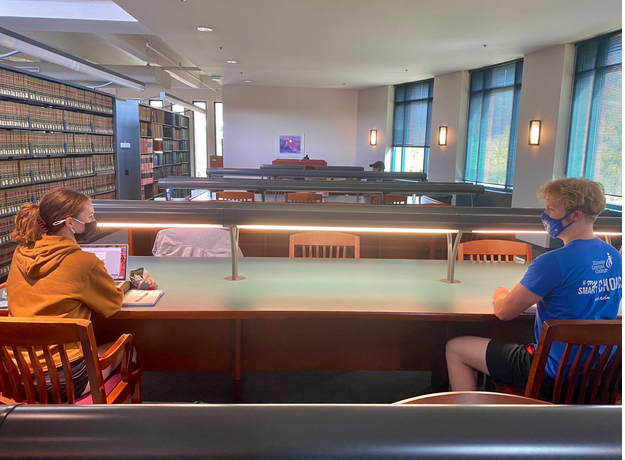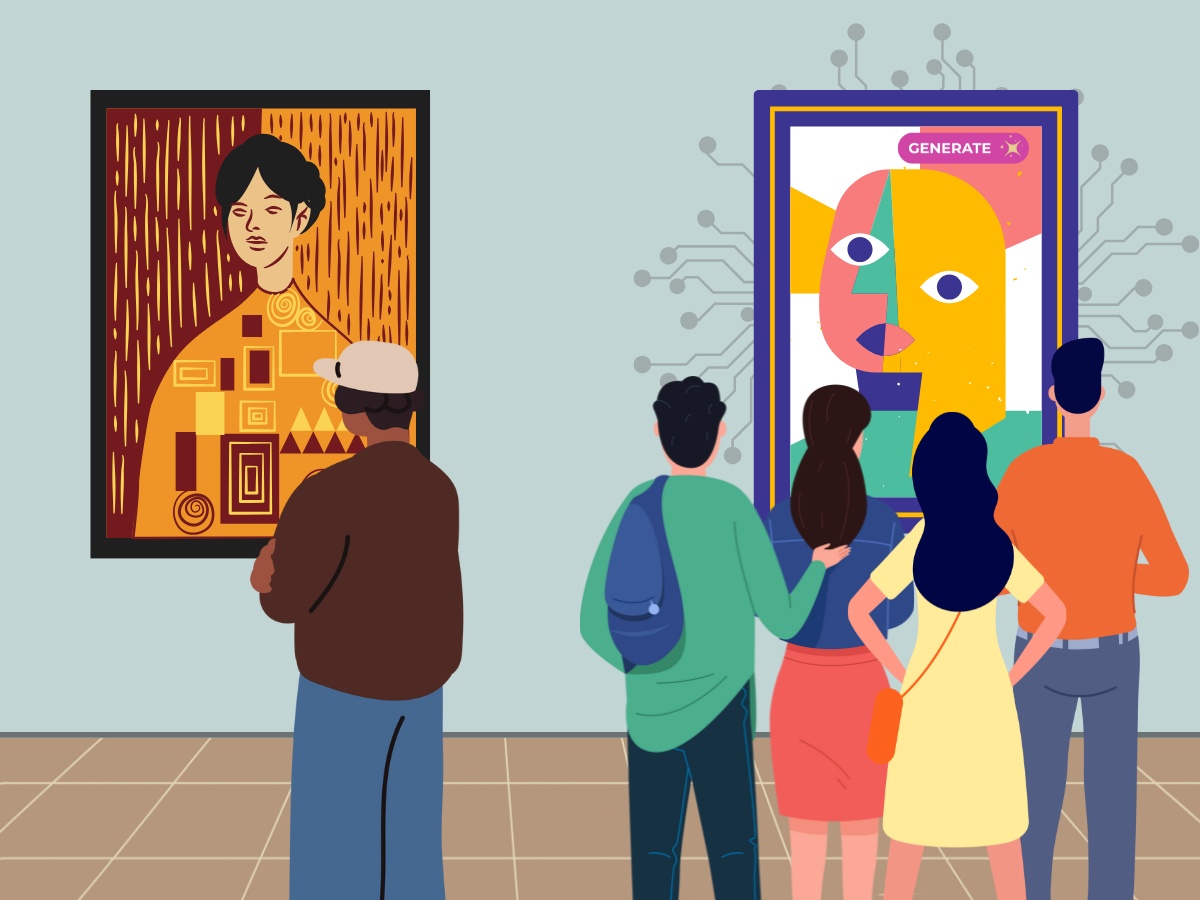It can be hard to make connections.
Picture this: you’ve been grouped off by a professor to have a “small group discussion” with some classmates you do not know. You awkwardly answer the prompts on the board, but after that, the conversation lulls. You end up exchanging uncomfortable pleasantries until the teacher calls the class back to attention. Or maybe you’ve gone to do your laundry at a public laundry room, and when you walk in, there’s a group of people getting their clothes out of the dryers. Though you try to think of something pleasant to say to them, you ultimately decide to just stay silent for fear you’ll say something weird or embarrassing.
Sadly, these types of situations are inevitable and happen to everyone. They’re awkward and uncomfortable, and we generally feel ridiculous after they happen. Especially in this time of general “newness” at the beginning of the school year, I think a lot of us are feeling heightened pressure to make good impressions, be open to conversations, and attract new friends. At the end of the day, we all just want to connect with the people around us.
The only problem is, making connections is a difficult thing to do. Some people are blessed with a natural ability to connect and converse with any person they meet, but for the rest of us, are there established steps we can take to actively improve our ability to connect with other people?
As I scoured various psychology websites to find the answer to this question, I started to notice a common theme in many of the suggestions: if you want to connect with others, you have to be actively selfless. In other words, you must strive to actively take your focus off of your own doubts and insecurities and instead, place it onto the needs and wants of others.
American writer and psychology pioneer Dale Carnegie said, “You can make more friends in two months by becoming interested in other people than you can in two years by trying to get other people interested in you.” The truth is, people are only going to want to get to know you if they enjoy the way you make them feel about themselves. While we often focus on the pressure to “sell ourselves” or “make a good impression” during a conversation, constantly obsessing over others’ opinions of you only leads to a more disastrously awkward exchange, making it all the more difficult to spark connections with others.
If you are a person who gets over-stressed about yourself in social situations, have no fear! Here are the top three most-suggested steps you can take to remove your focus from yourself and be intentional about uplifting the people you interact with on a day-to-day basis (as recommended by a plethora of random internet psychologists).
- Smile! As simple as it sounds, many of us accidentally keep our “RBF” on throughout the day and we forget to turn it off when we are trying to be social. Even if we don’t intend to come off as pissy or rude, when we look angry, bored, or unhappy, people will assume that we are angry, bored, or unhappy people. A little smile goes a long way in making others feel comfortable around you. As the well-known motivational writer William Arthur Ward said, “A warm smile is the universal language of kindness.”
Now, this doesn’t mean you have to paste a fake smile on your face 24/7 if you want to make friends. Instead, find a few times throughout the day to intentionally flash a smile at people — even if it feels uncomfortable at first! When you pass by someone on your dorm floor or in the hallway of an academic hall, don’t avert your eyes or pretend to answer a notification on your phone. Be intentional and smile! When you sit down near someone you’ve never met before in your AOI class, smile at them and — if you’re feeling rambunctious — even offer a little wave. A little smile goes a long way in showing your willingness to connect with others.
- Pay attention! Look people in the eyes when you talk to them. Take your earbuds out when you sit down in class. Put your phone down on the walk to your next building. Although we like to keep to ourselves and to our technology (it’s awkward to have nothing to do with our eyes or hands!), we end up unintentionally “giving off the impression of someone who prefers to be alone rather than to socialize,” according to Psychological/Brain Sciences Professor Dr. Susan Krauss. Now, you may very well be an introverted person who prefers to keep to yourself, but just because you are introverted doesn’t mean you don’t like to make friends like anyone else!
If you are a person who struggles to get that initial connection going even when you want to, you’d be surprised how many more opportunities you stumble across when you just keep your eyes open to the people around you. By no means am I suggesting you never walk to class with your headphones in ever again. Instead, just pick some concrete times to “unplug” yourself and look around, so you let the people around you know that you are interested in socializing and having a conversation with them.
- The “Offer And Ask” Method! Well, here we are! You’ve smiled at the person you’d like to get to know better, you’ve taken your headphones out, and you’re ready to spark that conversation. Now what? For this, I give you the “Offer and Ask” method. Disclaimer, I did not find this exact method on any particular site created by any particular professional. It is actually a combination of lots of different pieces of advice that I found, and it goes like this: offer a quick tidbit about yourself, and follow it up with a lighthearted question.
For example, if the weather is gorgeous outside, you could say, “I love the sunshine, don’t you?” Six words! Or you can think of something relatable, that any college student would have an opinion about. “Oh my gosh, I was up until midnight reading… Did you have a lot of homework yesterday?” Maybe, if you’re feeling extra bold, you can even make your question into an invitation: “I really don’t understand this homework… would you want to study together sometime?”
As I mentioned earlier, sparking connections with other people is ALL ABOUT making the other person feel better about themself as a result of speaking to you. People love it when others willingly ask to hear about their lives! Though we all love to talk about ourselves, entrepreneur and life coach Dr. Kerry Petsinger says that if we want to be a person who attracts and invites connection, we need to “be the person in the conversation who asks the questions.” Asking people questions signals that you are interested in what they have to say, and other people will be interested in spending more time with people who find them interesting!
BONUS TIP: Don’t let the fear of awkwardness keep you from trying! Of course, none of this advice is foolproof! You may smile at someone in the hallway, and in return they flip you off. Maybe you mention to the person sitting next to you how much you love your dog and you ask them if they have any pets… but then they inform you that their dog was recently run over by a car. Yes, these situations are uncomfortable and awkward and weird, but that is nothing to be afraid of! Sometimes the deepest connections can bud from the most embarrassing and wild of situations, but you’ll never know until you try. Hopefully, these tips will at least ease the awkwardness in your next small-group discussion or late-night laundry session, and you’ll be on your way to making meaningful and lasting connections with those around you in no time!







